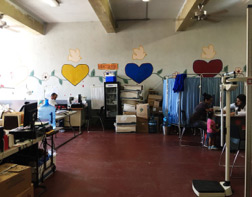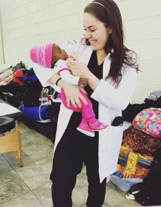PROJECTS

Jóvenes Sanos: Preventing IPV and Reproductive Coercion among Underserved Adolescents
There is increasing global recognition that addressing gender-based violence (e.g., intimate partner violence, reproductive coercion) among adolescents is a human rights and public health imperative.
 According to the World Health Organization (WHO) multi-country study on Women’s Health and Domestic Violence, physical and/or sexual violence from a male partner affects an estimated 1 in 5 adolescent girls. Furthermore, previous research has identified that experiences of reproductive coercion (RC) and intimate partner violence (IPV) are consistently associated with numerous negative effects on the physical, reproductive and mental health of women and girls. The prevalence of RC is highest among adolescents, with 20% of adolescent family planning (FP) clients reporting such abuse. Likewise, the prevalence of RC among women and girls reporting unwanted pregnancy is approximately double that of the general population. Therefore, ARCHES (Addressing Reproductive Coercion in HEalth Settings), a brief clinic-based intervention model in the U.S., that demonstrated reduce incidence of RC from male partners, increased self-efficacy of female FP clients to reduce their risk of unintended pregnancy and IPV, as well as increased knowledge and use of community-based IPV resources will be adapted and piloted for use in Mexico. ARCHES is designed to be implemented within routine family planning, maximizing the feasibility and sustainability of this program across multiple contexts. Currently, Dr. Servin is leading a study, in collaboration with the Mexican Ministry of Health and funded by the National Institute of Child Health and Human Development (NICHD) (K23 HD084756-01A1) to adapt and evaluate the ARCHES model for the Mexican family planning context.
According to the World Health Organization (WHO) multi-country study on Women’s Health and Domestic Violence, physical and/or sexual violence from a male partner affects an estimated 1 in 5 adolescent girls. Furthermore, previous research has identified that experiences of reproductive coercion (RC) and intimate partner violence (IPV) are consistently associated with numerous negative effects on the physical, reproductive and mental health of women and girls. The prevalence of RC is highest among adolescents, with 20% of adolescent family planning (FP) clients reporting such abuse. Likewise, the prevalence of RC among women and girls reporting unwanted pregnancy is approximately double that of the general population. Therefore, ARCHES (Addressing Reproductive Coercion in HEalth Settings), a brief clinic-based intervention model in the U.S., that demonstrated reduce incidence of RC from male partners, increased self-efficacy of female FP clients to reduce their risk of unintended pregnancy and IPV, as well as increased knowledge and use of community-based IPV resources will be adapted and piloted for use in Mexico. ARCHES is designed to be implemented within routine family planning, maximizing the feasibility and sustainability of this program across multiple contexts. Currently, Dr. Servin is leading a study, in collaboration with the Mexican Ministry of Health and funded by the National Institute of Child Health and Human Development (NICHD) (K23 HD084756-01A1) to adapt and evaluate the ARCHES model for the Mexican family planning context.
 This study seeks to adapt and pilot this intervention model in the Mexican family planning context so as to provide initial assessment of acceptability, feasibility, and preliminary indications of efficacy in this LMIC context. Formative research with family planning providers, clinical managers, family planning clients, and survivors of IPV is being conducted to inform the adaptation of the ARCHES model. The resulting model will then be tested in a pilot evaluation involving two clinics in Tijuana, Mexico.
This study seeks to adapt and pilot this intervention model in the Mexican family planning context so as to provide initial assessment of acceptability, feasibility, and preliminary indications of efficacy in this LMIC context. Formative research with family planning providers, clinical managers, family planning clients, and survivors of IPV is being conducted to inform the adaptation of the ARCHES model. The resulting model will then be tested in a pilot evaluation involving two clinics in Tijuana, Mexico.



